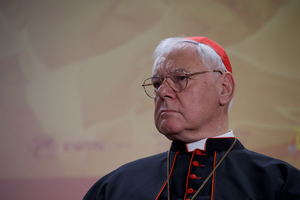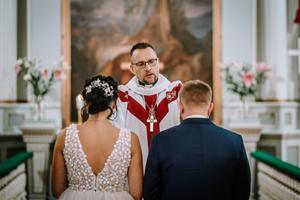The Pope’s Appointments: A Three-Year Assessment
Part I: The Holy Father’s selection of bishops reflects his determination to emphasize pastoral experience.

Selecting Church leaders is a crucial part of the Petrine office, allowing a pope to shape the Church of the future and line up his successor.
Since his election three years ago, the Holy Father has approved the ordinations of more than 500 priests as bishops and personally elevated 39 Churchmen to the College of Cardinals, of whom 31 are eligible to vote in a conclave (the current total of cardinal-electors stands just under Blessed Paul VI’s instituted limit of 120).
He has also made nearly a dozen appointments to heads of Vatican departments, appointed significantly more to lower-ranking positions, and nominated other leaders to head newly created commissions as part of the reform of the Curia.
A common thread running through the majority of these appointments, especially regarding new bishops and cardinals, is proven pastoral experience, or to put it in the Pope’s words: to be able and willing to live with the “odor of the sheep,” to go “to the ‘outskirts’ where there is suffering.”
A typical example of this approach took place last October. To the surprise of Church observers, Francis chose a well-regarded parish priest, respected for his pastoral work on the peripheries of society, to be the new archbishop of Palermo, Sicily. Archbishop Corrado Lorefice, 53, replaced Cardinal Paolo Romeo, who had reached retirement age.
“This is the way the Pope reasons,” said Opus Dei Father Philip Goyret, professor of ecclesiology at the Pontifical University of the Holy Cross in Rome. “It’s not that he should have a doctorate, or experience in the Curia. No, for him what’s important is pastoral experience, which really moves in a wider context of chiesa uscita (evangelization, going to the peripheries).”
The Holy Father outlined such a vision during his visit to the U.S. last September. Addressing U.S. bishops, he warned that a Christianity “that ‘does’ little in practice, while incessantly ‘explaining’ its teachings, is dangerously unbalanced.” He also told them to be “pastors close to people, pastors who are neighbors and servants.” He has frequently highlighted concern for the poor and migrants in his addresses to Church leaders.
Father Goyret sees such a pastoral focus as “important” and a “good criteria” to use. A number of new ordinaries, respected for their pastoral outreach — such as Archbishop Matteo Maria Zuppi, the new shepherd of Bologna, nicknamed the “Bergoglio of Italy” — have been raised to the episcopacy over the past three years.
Father Goyret also believes it is crucial for any new bishop to have some teaching abilities and theological and canonical training. Otherwise, he said, “How will he be able to judge” moral issues? This is seen as particularly important after the Pope’s reforms, most notably changes to the annulment process, which places greater canonical responsibilities on the shoulders of bishops.
Doctrine Downplayed?
But while some appointments have matched this criteria — for example, Francis recently appointed the well-respected former rector of the North American College, Msgr. James Cecchio, bishop of Metuchen, N.J. — Francis’ drive to choose “pastoral” bishops has also caused some concern. Critics of his choices have argued for some time that a prevailing false dichotomy between doctrine and praxis — that to be truly pastoral means being less doctrinal — is leading the Pope to appoint bishops who show laxity in their approach to Church teaching.
One example often raised is that of Archbishop Blase Cupich of Chicago, whom Francis personally picked after bypassing the usual channels of selection. The archbishop, a native of Omaha, Neb., who succeeded the late Cardinal Francis George in 2014, has been criticized for placing the importance of conscience over Church teaching and making abortion and poverty moral equivalents.
Another appointment was that of Archbishop Heiner Koch, appointed to Berlin in 2015 (the archdiocese elected him from a list of three proposed by Francis, one of the other candidates being Jesuit Father Hans Langendörfer, architect of a controversial new Church labor law that allowed ecclesial employment of remarried divorcees and active homosexuals). Archbishop Koch took part in a controversial meeting in Rome last May that was criticized for its heterodox content and lack of transparency. He has said presenting homosexuality as a sin “is hurtful” and favors admitting remarried divorcees to holy Communion.
In Italy, the Pope handpicked Bishop Nunzio Galantino to be secretary general of the Italian bishops’ conference. The prelate has been involved in a bitter feud with the bishops’ president, Cardinal Angelo Bagnasco, who is opposed to Bishop Galantino’s non-confrontational approach, especially regarding same-sex union legislation that the Italian Parliament passed on Feb. 26.
Bishop Galantino has said he struggles to identify with those praying the Rosary outside abortion facilities and has said the Church must make everyone feel at home, including “unconventional couples,” because the “burden of exclusion from the sacraments is an unjustified price to pay, in addition to de facto discrimination.”
Numerous leading Church figures, such as patristics scholar John Rist, who holds the chair in philosophy at The Catholic University of America in Washington, find such appointments “very discouraging.” Rist does not believe that the majority of the Pope’s choices “verge on the heterodox,” but “certainly some do.”
Rist believes that by appointing a few clearly orthodox bishops, “the Pope can say: ‘I am not changing doctrine, but reinforcing it.’ But by appointing the theologically ignorant or misguided, he opens the door — I fear deliberately — to radical changes,” especially regarding the Church’s moral teachings, Rist said.
Juan Miguel Montes, director of the Italian office of Tradition, Family and Property, told the Register he has “absolutely the same impression — it is what he is doing.” Others see him as “rolling back” advances made by Benedict XVI, who appointed more orthodox bishops.
Papal Choices
Father Goyret thinks these choices are a consequence of placing at the center what the Pope considers overriding pastoral concerns, rather than safeguarding doctrine. The Pope, he believes, is “neither conservative nor progressive,” stressing he doesn’t like to use such labels for a pope. Nor is he “against traditional theology or doctrine,” he said. “He just skips these categories and wants pastoral and missionary bishops.”
After Benedict XVI paid close attention to sound doctrine, Francis is trying, at some risk, to “find a different way because he believes that evangelization has to change,” Father Goyret said. “He says we’ve been worried too much about sound doctrine, but that does not mean he goes against sound doctrine.”
But even if the Pope’s appointments may be doctrinally solid, the change of emphasis is having other consequences. A senior Church source in Italy told the Register on condition of anonymity that although recent appointments in the country have been “good parish priests,” they don’t have the “personal gravity to be bishop.”
He said many of the new Italian bishops are “great at the fatherly gestures, hugging, kissing babies, but they are not teachers of the faith; they’re not prepared for that.” He added that the bishop has to be “a strong and courageous pastor and be able to govern the Church” and failing to appoint those “willing to make hard decisions makes the flock ill provided for.”
Selecting Bishops
Procedures for choosing bishops have been criticized in the past for being vulnerable to nepotism, and some see the process as similar to an oligarchy, in which only a selected and privileged few have a say in who is raised to the episcopate.
With some exceptions, until now in the Latin rite, it has been ultimately left to the apostolic nuncio to submit a terna (short list), usually of three names, to the Pope. Prospective bishops are vetted through consultation with various people, including the president of the bishops’ conference, Church and civic authorities and laity. The Pope makes the final decision.
Changes in how bishops are appointed are also in the Pope’s sights and being studied by the “C9” group of cardinals advising him on reform, as part of his reform of Church governance.
“This is on the agenda,” said Father Goyret. “The main issue is not to make the process more democratic, but to gain wider consensus,” he added. “It’s about acquiring information, establishing who is the better candidate in a diocese, so it will involve consulting more people.”
And as part of his decentralization plans, the Pope wants to move selection more to the local level, “rather than the nuncio and the Curia,” in order to improve the “quality of selection,” said Father Goyret. Papal diplomats say the problem is not with the terna so much as weaknesses in acquiring information: Questionnaires are too dated by conciliar expressions, they argue, and the laity rarely know the candidates well enough to evaluate them sufficiently.
A more local-centered procedure may help resolve such weaknesses in the system. Certainly, such a change would be in keeping with the Pope’s plans for Church decentralization, one that is more listening to the sensus fidelium (sense of the faithful). The Pope’s preference for this can be traced back to the influence on the Pope’s thinking of la teologia del pueblo (theology of the people) that was developed in 1967.
The theology, whose chief architect was Argentine theologian Lucio Gera, has similarities with liberation theology but differs from it, mainly by not placing “class struggle” at the center. Based primarily on the second chapter of the Second Vatican Council’s dogmatic constitution Lumen Gentium, it holds that globalization has led to processes of exclusion. As well as a “preferential option of the poor,” it promotes a “preferential option for the excluded.”
But if selection procedures for bishops did become more locally focused, Church historians say it would, in some ways, be reverting to what the Church practiced for centuries, in the sense that only relatively recently have popes had such a large say in bishops’ appointments. “Often in the past, popes had little or no role in the appointment of bishops,” said Rist. “In the ancient Church, it was a local affair, as with Ambrose and Augustine.”
Up until the 19th century, and especially in medieval times, the state or local dignitaries would often appoint bishops. When the Americas were largely under colonial rule, most of the ordinaries in Latin America were chosen by the king of Spain because he had all of the local information.
But Rist doesn’t see decentralization in this area as altogether helpful.
“There is a real difference between a world, more or less up to the 16th century, in which Christianity was taken for granted in many places and growing fast in others, compared with what we have now.” He believes it is “particularly important” that “the appointment of good bishops be regarded as of prime importance among papal duties” — especially in the West, where “we are in reverse gear.”
Looking Forward
Pope Francis’ impending apostolic exhortation on marriage and the family could give a strong signal about how determined he is to proceed with Church decentralization. But for now, his priorities in choosing bishops are expected to continue to emphasize pastoral abilities over teaching and doctrine.
At a recent episcopal consecration at the Vatican, Francis exhorted two new bishops to be faithful custodians and shepherds of the mysteries of Christ, following the “example of the Good Shepherd who knows his sheep.”
“Proclaim the word at every opportunity, whether it is appropriate or inappropriate,” the Pope said. “Watch over with love all the flock, where the Holy Spirit has placed you to sustain God’s Church. And do this in the name of the Father, whose image you render present: his Son, of whom you are constituted teachers, priests and pastors, and in the name of the Holy Spirit, who gives life to the Church and whose power supports us in our weakness.”
Edward Pentin is the Register’s Rome correspondent.
Part II of this article can be read here.
- Keywords:
- edward pentin
- pope francis
















